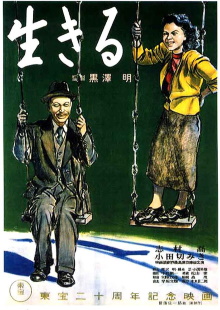
Ever since I watched One Wonderful Sunday, I felt that I liked it more than any of Akira Kurosawa’s more well known samurai films. Ikiru falls into precisely the same category, a drama film set in post-war Japan about the travails of everyday life. This one belabors its points a touch too heavily and could stand to be edited down a bit. But it is nonetheless wonderful and far more intelligent than I initially gave it credit for.
Kanji Watanabe is a career bureaucrat at city hall whose wife has died and now lives with his son and daughter-in-law. One day he learns that he has stomach cancer and has less than a year left to live. When he tries to break the news to his son he overhears their conversation and realizing that they only care about the inheritance they get after he dies, keeps quiet. As he has spent the last 30 years doing a meaningless job only out of love for his son, he feels empty and bereft of purpose. Wandering the city, he meets a novelist in a restaurant and recounts his story. The novelist takes pity on him and takes him on a hedonistic night out in the city. The next day a female colleague from his office seeks him out as she needs his approval to resign from her job. He finds himself agreeing with her that the job is a pointless waste of time as nothing meaningful gets done. He spends days following her around to understand what it is that makes her feel so alive and full of joy until even the woman gets creeped out.
This is a slow moving film that feels even slower due to the protagonist’s halting movements, his drawn out, almost indecipherable mumbling and his habit of using stock phrases like “in other words”. It’s also a little too heavy-handed in making its point. Nonetheless it is never boring as lead actor Takashi Shimura delivers a magnetic performance with his intense, wide-eyed stare. The use of a love ballad to capture the protagonist’s entreaty to everyone to appreciate the time that they have could easily be melodramatic but the film pulls off the bittersweet emotions with a powerful scene that will stay in your memory. It is particularly adroit of the director to have the main character die halfway through and have the rest of the film consist of other people trying to make sense of his actions during his wake. This ends up being a retrospective of his final months from the perspective of different characters, an approach that is reminiscent of Citizen Kane.
I was dismissive early on as last minute realizations at death’s door about having lived an empty life feels a little trite. I was even prepared to mock it as a very early example of the YOLO attitude when Watanabe is given a whirlwind tour of the Tokyo nightlife. But the film is intelligent enough to understand that there is more than one way to seek meaning and that amusing and novel as the sinful delights of the city are to Watanabe, it’s not the right path for him. I also disliked how the film characterizes government work as pointless bureaucratic time wasting as few people would truly disagree that regulation is a needed function of society. But then Kurosawa turns that around to show that it’s up to individuals to pursue useful and meaningful objectives in whatever they do. It’s brilliant and apt. I even liked how human and forgiving the film is. The attitude of Watanabe’s son may have bitterly disappointed him but he still loves his son and though he probably should not have made his son’s upbringing the sole focus of his life, it doesn’t necessarily mean that there’s anything to regret there.
Perhaps the film’s masterstroke is how it changes your perception of the main character over its course. His stumbling gait, near incoherent mumbling, fear of standing up for himself, even when he knows that his doctor is lying to him and his refusal to confront his son, marks him out as a pathetic old man. But by the end, though he becomes physically frailer than ever, we see him as a hero, powerful and iconic in his own way. That’s why this is a great film and Kurosawa is an incomparable director.
One thought on “Ikiru (1952)”